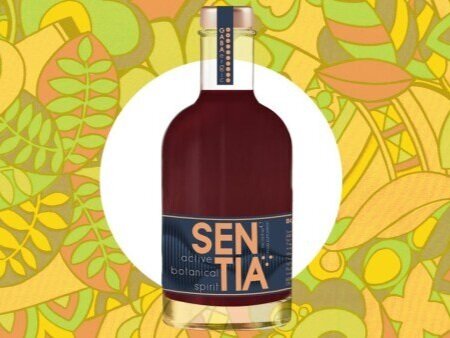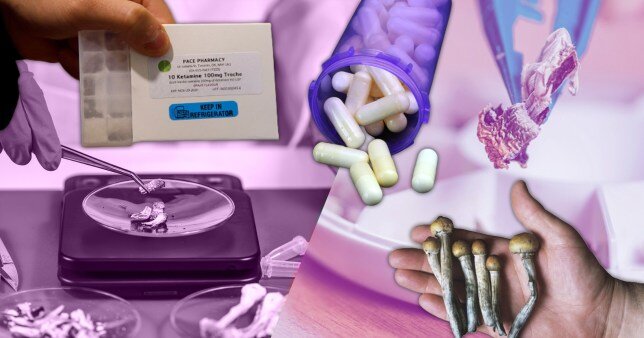Cast your mind back to a time when you could go on a night out.
You’d start with a G&T or a glass of bubbles as you put on your mascara. Then, drinks out at a bar: a couple of cocktails or pints of lager. It could easily end up with Jagers on the dancefloor, or tequila shots at an afterparty – and most likely, a nauseous train journey to work the next morning, or a full English fry-up to kick off a Saturday on the sofa.
Alcohol is ingrained into the way that we socialise. 82% of British adults drink alcohol regularly and our obsession with ‘the pub’ made itself painfully clear as lockdowns came and went – alongside trips to the local boozer – throughout 2020.
Yet there’s growing cultural awareness about the dangers of excessive alcohol consumption. Alcohol Change UK reports a steady rise in non-drinkers between the ages of 16 and 24, and the non-profit predicted that 6.5 million people would take part in Dry January this month. That’s up from 3.9 million in 2020, and just 4,000 when the concept launched in 2013.
However, many of us have scrapped Dry January as we struggle with the latest UK lockdown. YouGov figures found that a third of people pledging to stay off booze this month had given up in the first week, and Waitrose beer sales were up 49% after week one of lockdown.
For many of us, to give up alcohol under lockdown is to lose one of the remaining small pleasures getting us through it. But the British public is caught in an arm wrestle between the knowledge that alcohol is harmful – in 2019, alcohol-related hospital admissions in the UK had reached an annual peak of 1.26 million – and the fact that drinking it is so pervasive in our society. For many, it’s also very enjoyable.
There’s a solution to all this.
What if we told you that you could enjoy all the positive effects of alcohol, but end up with no hangover or damage to your health?
It sounds like something from a sci-fi, but a drink like this has been invented. You can buy it online right now.
Sentia Spirits is the brainchild of David Nutt, Professor of Neuropsychopharmacology at Imperial College London. Once a government drugs advisor, Nutt was sacked in 2009 for highlighting the hypocrisy of drug policy in the UK. Famously, he presented evidence that alcohol is more harmful to society than heroin or crack.
‘Alcohol is the most harmful drug in the UK,’ says Nutt, now.
‘It’s the most common drug that we encounter causing damage to people, in every branch of medicine. As a doctor and scientist, my life’s work has been trying to reduce the damage of alcohol – and this is a way of doing it.’
The science behind Sentia
Sentia is a non-alcoholic drink made of a licensed, ‘Botanical GABAergic Blend’ from Nutt’s team at GABA Labs.
There are other botanical drinks on the market – like Three Spirit Drinks, which uses ingredients like cacao and lion’s mane for mood-boosting, energising effects. Not to mention the slew of non-alcoholic beers, wines and spirits already flooding the market.
But Sentia does much more than mimic the taste and texture of an alcoholic spirit: it actually gets you tipsy. The magic recipe has been developed from decades of scientific research into the way that alcohol affects the brain.
‘Sentia is the first drink to replicate the pro-social effects of alcohol, by targeting the brain system that mediates them,’ says Nutt.
‘It started in 1980 when I was doing my PhD. I discovered an antidote to alcohol and thought, this is amazing – you could take it at the end of a night out, get sober and find your way home.
‘But my professor said, what’s the point of that? Isn’t the alcohol still going to be killing your liver? And won’t people just drink more?
‘Nevertheless, it was the first step into discovering how alcohol works in your brain.
‘The main calming transmitter in your brain is called GABA [gamma-Aminobutyric acid]. Alcohol enhances GABA, which is why it relaxes you and makes you more convivial.
‘Over the last 40 years or so we’ve been working to understand the GABA system in the brain. It turns out it’s a very sophisticated system with multiple parts, and alcohol stimulates them all. We’re trying to stimulate the good effects of alcohol, without the bad.’
This research has branched into two directions. The long-term project is the invention of a synthesised, alcohol-alternative molecule. Then there’s Sentia: the herbal alternative, which took the past two years to create.
‘Hopefully it’ll raise enough money to fund the more expensive, chemistry part,’ says Nutt.
‘We’re in the process of raising funds to take the molecules through safety testing, so they can become foodstuffs ingredients in a few years’ time, but that costs millions of pounds.
‘So to raise that money and develop the concept, we started looking for botanical ingredients that would work in a similar way to GABA. We identified four plants that in combination, and with uptake enhancers, produced this effect.
‘All the ingredients are either foods or food additives, so they’re covered by safety standards already.’
The herbal combination is top secret for now, but I wanted to get my hands on a bottle.
What’s drinking Sentia like?
In a glass, bell-jar-style bottle, Sentia looks like a boutique gin or whisky – and at £30 for a 50cl bottle, the price tag more-or-less matches that description. It’s a rich magenta in colour, complementing its lavender label and pouring out thick and juice-like.
It doesn’t have a strong smell – just a hint of botanicals. Neat, over three cubes of ice, its full flavour comes through: a strong, herbaceous first taste, followed by sweetness, then a clove-like aftertaste. It’s a bit like mulled wine. Add tonic water or lemonade and it becomes a sweet and tangy aperitif, bold enough in flavour and texture to easily hold up against any other mixed drink I might rustle up from the cupboard.
After one glass, I feel just like I would after a gin and tonic (my usual go-to). My cheeks are slightly flushed and I’m definitely more relaxed. After a second, I’m a bit giggly and chatty. How far can I take this, I wonder? I drink a third, then a fourth, but the sensation doesn’t progress much further. Unlike with alcohol, you can’t get beyond that initial tipsy feeling.
‘We want you to get a good effect that plateaus,’ says Nutt, confirming that it’s not possible to get wasted on Sentia.
‘The effects might last longer, but it’s not poisoning the body in the same way that alcohol does.’
Could you drink Sentia as a designated driver, or underage, or pregnant?
‘We suggest over 18s only and have no data for pregnancy or breastfeeding yet,’ says Nutt.
And while there’s no evidence of impairment with Sentia, the team won’t recommend it for designated drivers as people might be affected by it differently.
On the plus side, Sentia’s been found to improve sleep in some people and you don’t get the munchies – which means no more 3am kebabs. Plus, I woke up the next morning feeling entirely hangover-free, which would not have been the case had I swapped those Sentia measures for vodka.
The future of drinking?
Post-lockdown, it might not be long before you spot Sentia in delis, specialist drinks shops or behind the bar at high-end cocktail spots (not least at Pulp, a bar that Nutt co-owns in Ealing). Going forward, the range of flavours or effects could expand, or it could enter the world of mixology, especially if a clear-liquid version is made available. All are in the works at GABA Labs.
It’s safe to say there’s a market for all this. In 2020, 11 new non-alcoholic spirit brands launched in the UK market, making a grand total of 42. As fewer millennials choose to drink alcohol, the market for alternatives is growing drastically, including variations from big drinks brands like Gordon’s and Martini. It’s similar to Big Tobacco’s investment in e-cigarettes, or the backing of the meat industry for vegan mock meats.
‘Let’s face it, the drinks industry has known for hundreds of years that alcohol is not very good for your body,’ says Nutt.
‘Now that the rest of the world has wisened up to that, it would make a lot of sense for them to have drinks like this as part of their portfolio. I suspect many alcohol companies will want to join us. It makes commercial sense.’
There’s still a place for recreating comforting classics with non-alcoholic spirits. Gordon’s deliciously juniper-infused 0.0% spirit went on the market just before Christmas, and – like Seedlip – it shows that a grown-up, treaty drink doesn’t have to involve booze.
But these drinks will always be missing something.
‘80% of adults drink alcohol,’ says Nutt.
‘Why? Because they enjoy the sensation. For most people, many of their pleasant social interactions have occurred alongside alcohol.
‘All we’re trying to do is give them something that will do what they want, but with very, very reduced risks of harm.’
There’s nothing wrong with enjoying the sensation of alcohol, and GABA Labs is certainly not trying to replace alcohol for good. But an actual alcohol alternative, that makes Dry January fun? I’ll drink to that.
Original post: https://metro.co.uk/2021/01/22/alcohol-free-spirit-sentia-promises-good-effects-of-booze-without-a-hangover-13947226/

